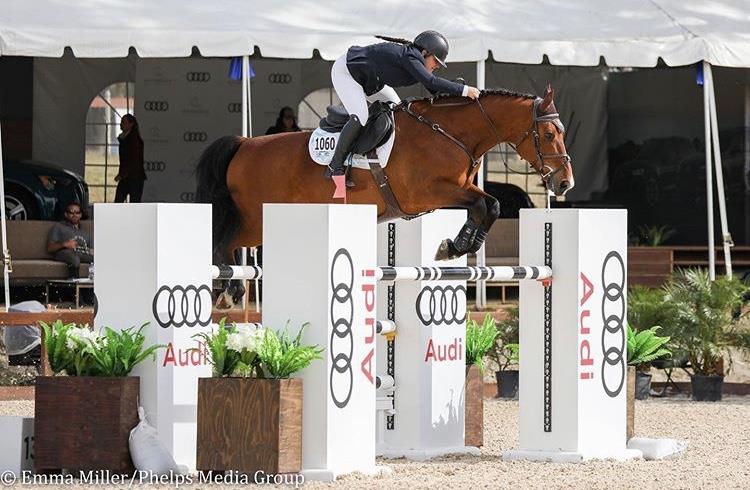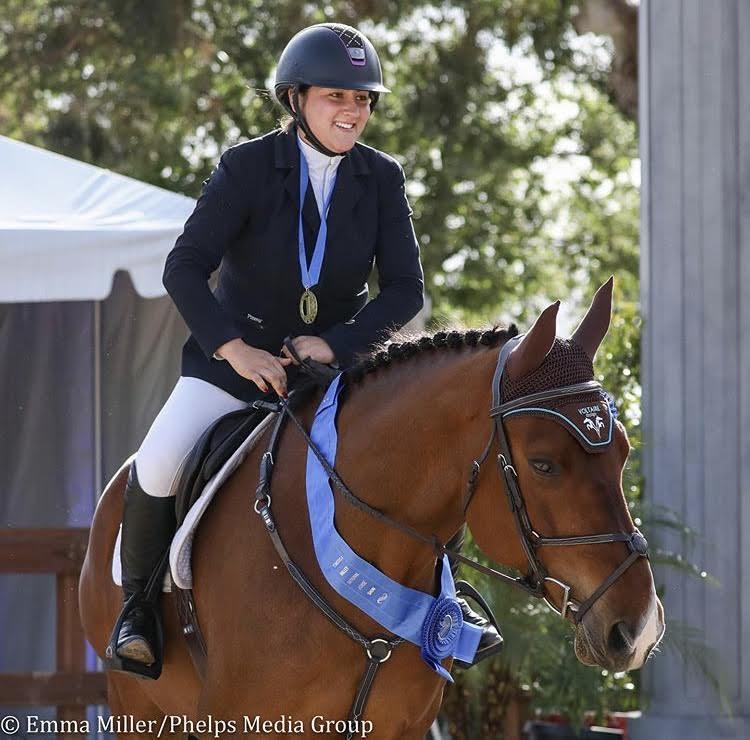
Photo: Emma Miller/Phelps Media Group
There’s no doubt that 20-year-old University of San Diego student Sloan Elmassian is a serious athlete. A high-level jumping competitor, she devotes six or seven days a week to her sport and her horse, driving 40 minutes each way to practice. Elmassian is an up-and-coming U.S. athlete who has competed at FEI competitions in U.S., Great Britain, and Belgium. In the spring of 2019, she won the U25 Jumper Classic during two different weeks at the Temecula Valley National Horse Show in Temecula, Calif. She recently turned professional, all while carrying a full load at USD, where she’s a junior majoring in law, crime, and justice studies.
So it understandably troubled her that her university would not officially recognize her as a collegiate athlete—a recognition that also can bring practical benefits, like priority registration for classes.
“For the first five semesters—the first two-and-a-half years—I was not able to register for classes at the same time as other collegiate athletes because I wasn’t classified or considered an athlete, because equestrian jumping was unrecognized there as a collegiate sport,” Elmassian explained.
At the start of her sophomore year, Elmassian decided to try to change that. Over the next several months, she put the case for equestrian sports’ recognition to everyone she could find, from several directors in the university’s athletics department all the way up to the top of the administration.
“Each time, my request was declined,” she said. “It’s a little blow to your confidence each time, because it’s something you’re so passionately fighting for and hoping for, but, as a mentor of mine told me, ‘All things worth having are worth fighting for.’ Just like with riding, when you fall down, you get right back up—quitting isn’t an option.
“Basketball players have training in the morning, and then they have classes afterwards, but why is it that equestrian show jumping is considered less of a sport?” Elmassian continued. “There’s volleyball, basketball, baseball, soccer—but no one ever talks about horseback riding. That’s not to put other sports down, but our sport is important, too, and people need to take notice.”
The University of San Diego finally has. This spring, after Elmassian presented her case to USD Vice-Provost Dr. Thomas Herrinton, and almost eight months after she started her campaign, USD revised its policy to include collegiate equestrians among its athletes.
“In an unprecedented decision, he agreed moving forward that if any USD student can provide the university with proper

Photo: Emma Miller/Phelps Media Group
documentation that they are being trained to represent our country, they will be granted priority registration as a student athlete,” Elmassian said. The turning point, she said, came when US Equestrian President Murray Kessler sent a letter to the university, describing in detail the athleticism, training, competitive schedule, and more that an equestrian sport requires.
“While the training needs of equestrians differ from those of a marathon runner or football athlete, they are most certainly athletes,” Kessler said in the letter. “Symmetry, balance, agility, flexibility, strength, endurance, motor ability, nutrition, and injury prevention are all physiological aspects an equestrian athlete must address. …
“Equestrian athletes have an additional challenge that other athletes do not, and that is they are working with another living being, their horse. A successful equestrian athlete must be a sports psychologist to the horse, as well as the first responder when it comes to the training and development of that horse. Equestrian is not a sport that an athlete can ‘pick up and put down’; it requires commitment and focus.”
The effort to get a school administration to recognize equestrian sports is a familiar one for Elmassian, who noted that her elementary and high schools also didn’t recognize the sport. Like many young equestrian athletes, Elmassian participated in US Equestrian’s Lettering Program. Through efforts like the Lettering Program and US Equestrian President Murray Kessler’s letter of support, available here for use by equestrian students anywhere, US Equestrian is committed to helping equestrians, whatever their breed or discipline of choice, gain recognition as the athletes they are.
“I’d like to draw attention to the USD administration for supporting my equestrian endeavors and recognizing me as an athlete, both with their break in the policy to support me and with being flexible in meeting the needs of athletes,” Elmassian said. “The important outcome in all of this is a change in policy that breaks the barrier of athletic bias and provides a level playing field for collegiate equestrian athletes, as well as any other athlete in any other sport. Hopefully, other universities will follow USD’s precedent and recognize that equestrians are athletes just like anybody else.
“I believe it speaks volumes about USEF and about their leadership in our sport to encourage young athletes to invest in a higher education while simultaneously pursuing their passion and higher levels of the sport.”


